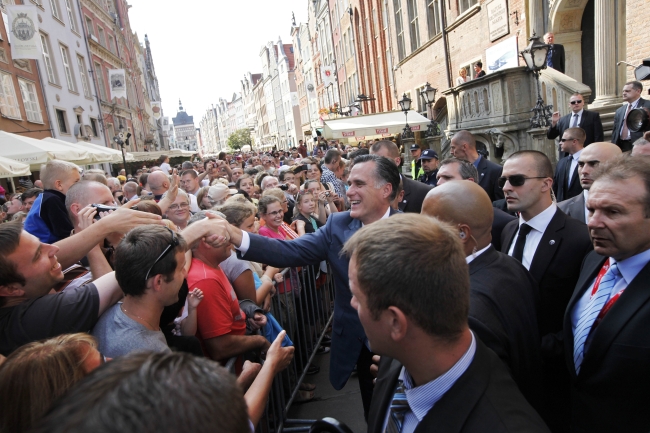WASHINGTON (AFP) ― It’s easy to dismiss Mitt Romney’s foreign trip as a debacle after the White House hopeful’s controversial comments in London and Israel. Harder to discern is whether he has helped or hurt his case with US voters.
Romney has lurched from one hiccup to the next on his first venture onto the global stage, offending the British by questioning their readiness to host the Olympics, then infuriating Palestinians by saying Jerusalem is Israel’s capital and that Israeli “culture” helps them succeed economically.
And in Poland, his meeting Monday with Lech Walesa was given an awkward tint when the Solidarity union which the anti-communist hero headed in the 1980s said it had nothing to do with inviting Romney and actually supports American unionized workers widely disparaged by Romney and his fellow Republicans.
Romney, struggling to overcome criticism about his business record and refusal to release more than two years of tax returns, was hoping his sojourn would set him apart from President Barack Obama on a few key fronts, namely that he could be a better friend to Britain, Israel and Poland and stand up more forcefully against Iran and Russia.
 |
Republican presidential candidate, former Massachusetts Gov. Mitt Romney greets the crowd after meeting with Poland’s Prime Minister Donald Tusk at The Gdansk Old Town Hall, in Gdansk, Poland, Monday. (AP-Yonhap News) |
He is also looking to shore up support among millions of pro-Israel evangelical Christian voters in the United States, many of whom remain suspicious of Romney’s conservative credentials, and wean Jewish voters away from Democrat Obama, who handily won that demographic in 2008.
Scholar Aaron Miller at the Woodrow Wilson Center, a former adviser to Republican and Democratic secretaries of state, gave Romney’s trip a four out of 10.
“With the pro-Israeli community ... I think it probably helped him,” Miller told AFP, citing Romney’s reassurances that he opposed Iran developing the capacity to produce a nuclear bomb and supported Israel’s right to defend itself.
“But with respect to demonstrating his foreign policy acumen, demonstrating his agility to respond cleverly and substantively, let alone wisely, I think he dropped the ball.”
With just 99 days to go before the election, Romney’s campaign was seeking a more favorable outcome from his trip than the headlines in Britain (“Mitt the Twit” was one) and the disbelief in Palestinian quarters over his comments in Israel.
The White House jumped on the gaffes as examples that Romney was not ready for his presidential close-up, and Obama’s re-election campaign highlighted the low points of the challenger’s trip.
“He’s been fumbling the foreign policy football from country to country,” Obama campaign spokeswoman Jen Psaki said. “This raises some questions about his preparedness.”
Miller said Romney might suffer when Obama drills into the gaffes made in London. But he and other observers acknowledged that the election will hinge almost exclusively on the health of the U.S. economy and perception of Obama’s ability to help create American jobs.
Veteran Democratic congresswoman Marcy Kaptur said Romney’s jaunt “is nothing more than a superficial diversion” from some of the criticism that he has faced on the trail in the past month.
But even in her criticism, Kaptur said “this trip is not going to change the November election.”
Still, with the 2012 presidential race on a knife edge, the benefits of Romney’s risky comments ― swaying enough Jewish voters and firing up evangelicals to tip the scales in some key swing states ― could outweigh the negatives.
Stephen McInerney, executive director of the non-partisan Project on Middle East Democracy, said Romney’s statements in Israel may have marked a clear calculation to appeal to Jews and evangelicals who wanted reassurances of a more muscular support of Israel.
“And to be frank, statements that offend Palestinians don’t have a track record of hurting American political candidates,” McInerney said.
Romney will return to U.S. shores this week, reintroduce himself to the American people, and soon pick a vice presidential candidate ― and his three-nation swing could be a distant memory.
“I don’t think that a gaffe or a YouTube moment is really going to make or break this particular election,” Kevin Madden, a senior Romney advisor, told ABC’s “This Week” program on Sunday.
“I think that the headlines that come out of London on one day are not going to be as important as the overall view that people take when it comes to our economic prosperity here at home.” Miller appeared to agree.
“I don’t think it hurt him,” he said of Romney’s trip. “Did it help? That’s a first-week-in-November question.”








